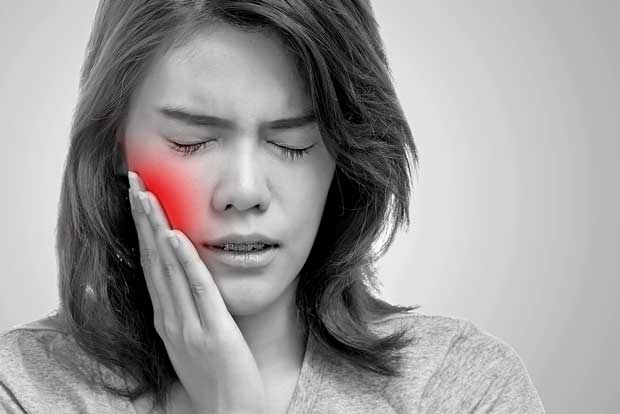Reply To:
Name - Reply Comment

 Does an excruciatingly painful sensation flare up every time you sink your teeth into something hot, cold or sweet? This can be torture especially if you are a foodie and live to eat. It isn’t always just about those delectable treats. Even a sip of hot or cold beverage could get those pain receptors all fired up! Getting to the root of the problem, all these symptoms could only mean one thing- Dentin Hypersensitivity or root sensitivity. Doesn’t it ring a bell? Well, then realisation will dawn when the problem is simply termed ‘Tooth Sensitivity’. Health Capsule spoke to Dr. Vipula Wickramasinghe, General Secretary of the Sri Lanka Dental Association and Regional Dental Surgeon of the Colombo District, to get a clear picture on dental trauma that makes people clutch their jaws in pain.
Does an excruciatingly painful sensation flare up every time you sink your teeth into something hot, cold or sweet? This can be torture especially if you are a foodie and live to eat. It isn’t always just about those delectable treats. Even a sip of hot or cold beverage could get those pain receptors all fired up! Getting to the root of the problem, all these symptoms could only mean one thing- Dentin Hypersensitivity or root sensitivity. Doesn’t it ring a bell? Well, then realisation will dawn when the problem is simply termed ‘Tooth Sensitivity’. Health Capsule spoke to Dr. Vipula Wickramasinghe, General Secretary of the Sri Lanka Dental Association and Regional Dental Surgeon of the Colombo District, to get a clear picture on dental trauma that makes people clutch their jaws in pain.
From a medical perspective
A tooth basically consists of the enamel, dentine and pulp. The enamel is a hard and dead tissue with no nerves. The dentine consists of nerve endings, while the pulp is located at the centre of the tooth, made up of living connective tissue and cells called odontoblasts. “When the dentine of the tooth gets exposed to certain stimuli (heat, cold, sweetness), a sharp throbbing sensation is felt which doesn’t last for long. It is experienced in an ‘on and off’ basis.”
Both young and old suffer
Dr. Wickramasinghe mentioned that tooth sensitivity was a very common dental issue among many. Generally, tooth sensitivity affects older adults within the ages of 45-50. However, tooth sensitivity complaints due to cavities come from both the young and old, age aside.
‘No cavities without sugar’
According to Dr.Wickramasinghe, tooth sensitivity is caused due to several reasons. Dental cavities, attrition, abrasion, tooth fractures and root exposure due to gum disease are some of the causes. “A common cause is cavities. When the decay reaches the dentine, it is easily exposed to external stimuli like heat, cold, sweetness and acidity in food items, which result in tooth sensitivity when consuming them. Attrition is another factor, which is the wearing off of the tooth. This could be due to ageing or attrite grinding. Abrasion of the tooth occurs with continuous and excessive brushing of teeth. In this case the dentine gets exposed. Tooth fractures may also result in dentine exposure, contributing to sensitivity. With the ageing of a person and due to gum disease, the roots of the tooth may become exposed to the external environment. This causes root exposure, which is yet another reason for tooth sensitivity.”
Practicing good food habits
If you don’t want to suffer painful tooth sensations each time you devour a feast, prevention is better than cure, and this should remain your number one priority. Dr.Wickramasinghe described several methods you could follow to prevent sensitivity and reduce pain. The most important is to maintain healthy oral hygiene. Cavities, another dental condition, are detrimental to oral health. This could lead to more pain by giving rise to tooth sensitivity, which is why you should brush twice a day. Practicing good food habits and reducing sugar intake is another way to prevent cavities. Minimizing the risk of cavities ultimately helps in the prevention of tooth sensitivity and leaves you with a sparkling smile. If you suffer from tooth cavities, the appropriate treatment has to be taken by visiting your dental surgeon before sensitivity gets the better of you. Dr. Wickramasinghe also recommends visits to the dentist every 6 months to keep your oral health intact to make sure your mouth is not plagued by cavities and gum diseases. “Brushing habits also affect tooth sensitivity. Brushing with hard bristles increases the probability of falling victim to tooth sensitivity. Thus, toothbrushes with soft bristles are encouraged. Do not brush your teeth with forced continuity. Use of tooth powder is not advised as they have an abrasive impact on the teeth. Use of fluoridated toothpastes is the best option.”
tooth filling as treatment
Patients suffer from tooth sensitivity due to various reasons. The treatments thus vary from person to person. The right treatment can only be concluded upon a dental check-up with your dental surgeon after a definite diagnosis. “Teeth sensitivity due to cavities, abrasions and attritions can be treated by tooth fillings which vary depending on the damage. General tooth sensitivity calls for desensitizing toothpastes and mouthwashes. However, it should be noted that these toothpastes and mouthwashes do not help in dealing with sensitivity caused by cavities. Therefore, tooth sensitivity cannot be treated by resorting to self-diagnosis and home remedies. Always consult your dentist for proper diagnosis and treatment.”
Toothpaste to the rescue!
Using toothpaste kills two birds with one stone. Using fluoridated toothpaste will help maintain healthy teeth and prevention of cavities. In the case of general tooth sensitivity, desensitizing toothpaste will save the day, while also being softer on the teeth unlike tooth powder. Follow it with a gurgle of desensitizing mouthwash and you are good to go.